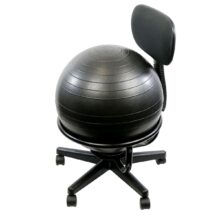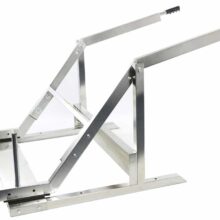Ball Chair
Se connecter pour obtenir les prix des revendeurs
The CanDo® Metal Ball Chair is an ergonomically designed dynamic seating solution featuring an inflatable exercise ball and a sturdy chair base.
Fitness equipment plays a vital role in sports medicine, serving as a valuable tool for athletes’ performance enhancement, injury prevention, and rehabilitation. From cardiovascular machines to strength training apparatus, fitness equipment offers athletes and sports medicine professionals numerous benefits in optimizing athletic performance, improving overall fitness, and facilitating effective rehabilitation.
In this article, we will explore the significance of fitness equipment in sports medicine and highlight its various roles in promoting athlete well-being.
Fitness equipment provides athletes with the means to enhance their performance in various aspects of their sport. Cardiovascular machines, such as treadmills, stationary bikes, or elliptical trainers, improve cardiovascular fitness, endurance, and stamina. These machines allow athletes to engage in high-intensity interval training (HIIT) or targeted aerobic workouts, replicating the demands of their specific sports. By incorporating cardiovascular exercise into their training routines, athletes can improve their overall fitness levels, boost oxygen delivery to muscles, and enhance their performance during competitions.
Strength training is a fundamental component of sports medicine, aimed at improving muscular strength, power, and injury prevention. Fitness equipment, such as weight machines, free weights, resistance bands, and suspension trainers, provides athletes with the means to perform targeted strength exercises. These exercises help athletes develop the necessary muscular strength and stability required for their sports, enhancing performance and reducing the risk of injuries. Strength training also aids in the rehabilitation process, allowing athletes to regain strength and functional abilities following injuries.
Fitness equipment plays a crucial role in the rehabilitation of athletes recovering from injuries. Sports medicine professionals utilize specialized equipment, including balance boards, stability balls, resistance bands, and functional trainers, to facilitate the rehabilitation process. These tools help athletes regain strength, range of motion, and neuromuscular control following injuries or surgeries. Additionally, fitness equipment allows for targeted exercises that aid in the prevention of future injuries by improving muscular imbalances, stability, and joint integrity.
Flexibility and mobility are essential for optimal athletic performance and injury prevention. Fitness equipment, such as foam rollers, stretching machines, or yoga props, supports athletes in improving flexibility, joint range of motion, and overall mobility. These tools facilitate targeted stretching exercises that help lengthen muscles, increase joint flexibility, and enhance athletes’ ability to perform dynamic movements effectively. By incorporating flexibility training into their routines, athletes can reduce the risk of muscle strains, improve posture, and achieve optimal movement patterns.
Functional training is a popular approach in sports medicine that aims to replicate sports-specific movements and improve athletes’ functional abilities. Fitness equipment, such as suspension trainers, medicine balls, agility ladders, and plyometric boxes, enables athletes to engage in functional training exercises that simulate the demands of their sports. By performing exercises that involve multi-joint movements, coordination, and agility, athletes can enhance their sport-specific skills, proprioception, and overall athletic performance.
Advanced fitness equipment often incorporates monitoring and tracking capabilities, providing valuable data for sports medicine professionals and athletes. Equipment such as heart rate monitors, GPS devices, and fitness trackers can measure various parameters such as heart rate, speed, distance, and calorie expenditure. This data assists in monitoring athletes’ progress, optimizing training regimens, and making informed decisions regarding performance enhancement or injury prevention strategies.
Fitness equipment plays a vital role in sports medicine, contributing to athletes’ performance enhancement, injury prevention, and rehabilitation. From cardiovascular machines to strength training apparatus, fitness equipment provides athletes and sports medicine professionals with versatile tools for optimizing athletic performance, improving overall fitness, and facilitating effective rehabilitation.


Se connecter pour obtenir les prix des revendeurs
The CanDo® Metal Ball Chair is an ergonomically designed dynamic seating solution featuring an inflatable exercise ball and a sturdy chair base.

Se connecter pour obtenir les prix des revendeurs
The CanDo® Inflatable Reciprocal Stepper Cushion has foot-shaped inflatable pods for vestibular challenge. Adjust vestibular difficulty by inflating or deflating pods.

Se connecter pour obtenir les prix des revendeurs
The Rickshaw Rehab Exerciser is a versatile exercise tool designed for individuals who need to use a wheelchair and require increased arm strength for this purpose. Can be used with any standard width wheelchair either at home or under therapist supervision. Latex and silicone free.